Summaries | Describe, Interpret, Evaluation and Plan
VerifiedAdded on 2022/08/29
|5
|1123
|32
AI Summary
Contribute Materials
Your contribution can guide someone’s learning journey. Share your
documents today.
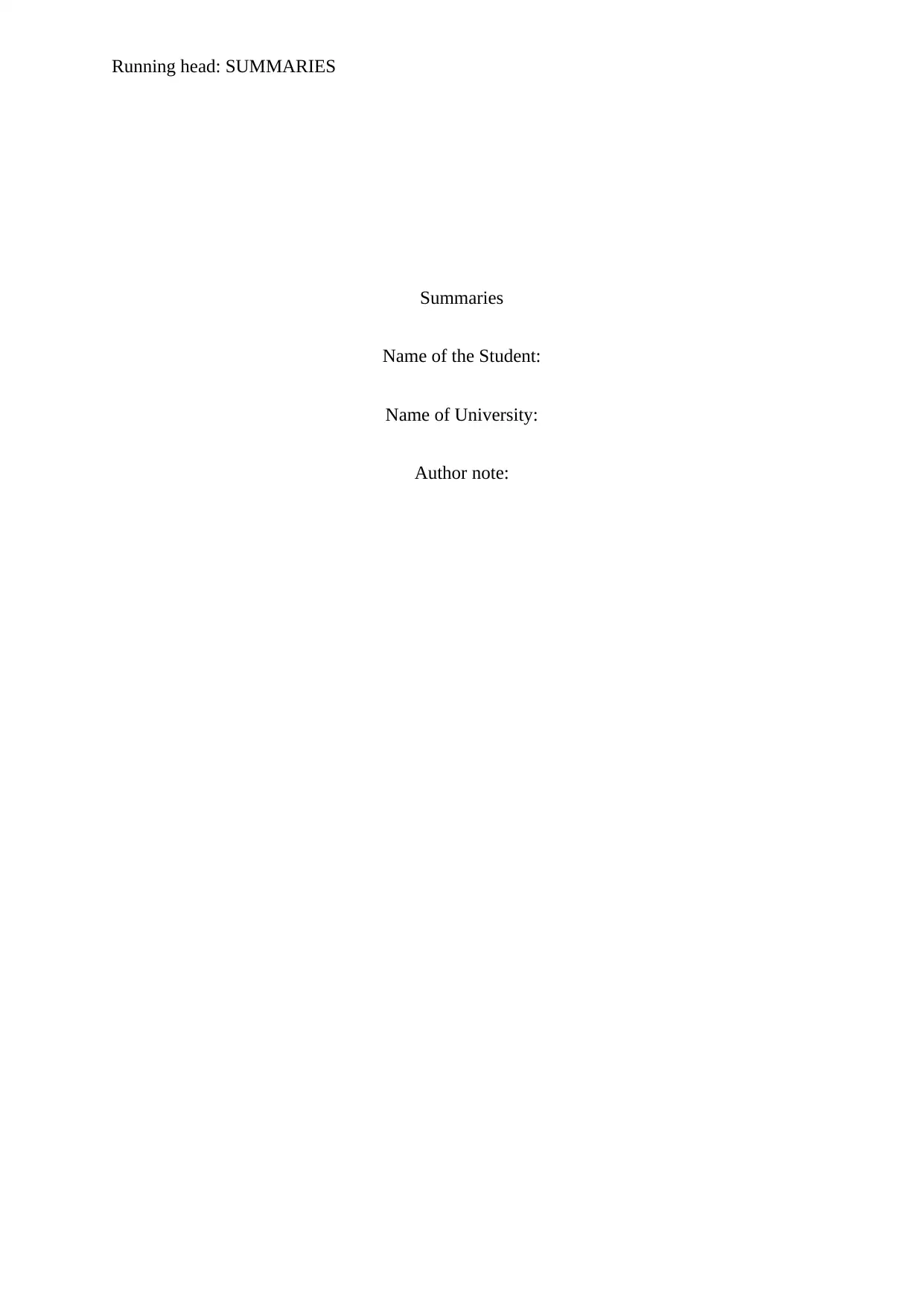
Running head: SUMMARIES
Summaries
Name of the Student:
Name of University:
Author note:
Summaries
Name of the Student:
Name of University:
Author note:
Secure Best Marks with AI Grader
Need help grading? Try our AI Grader for instant feedback on your assignments.
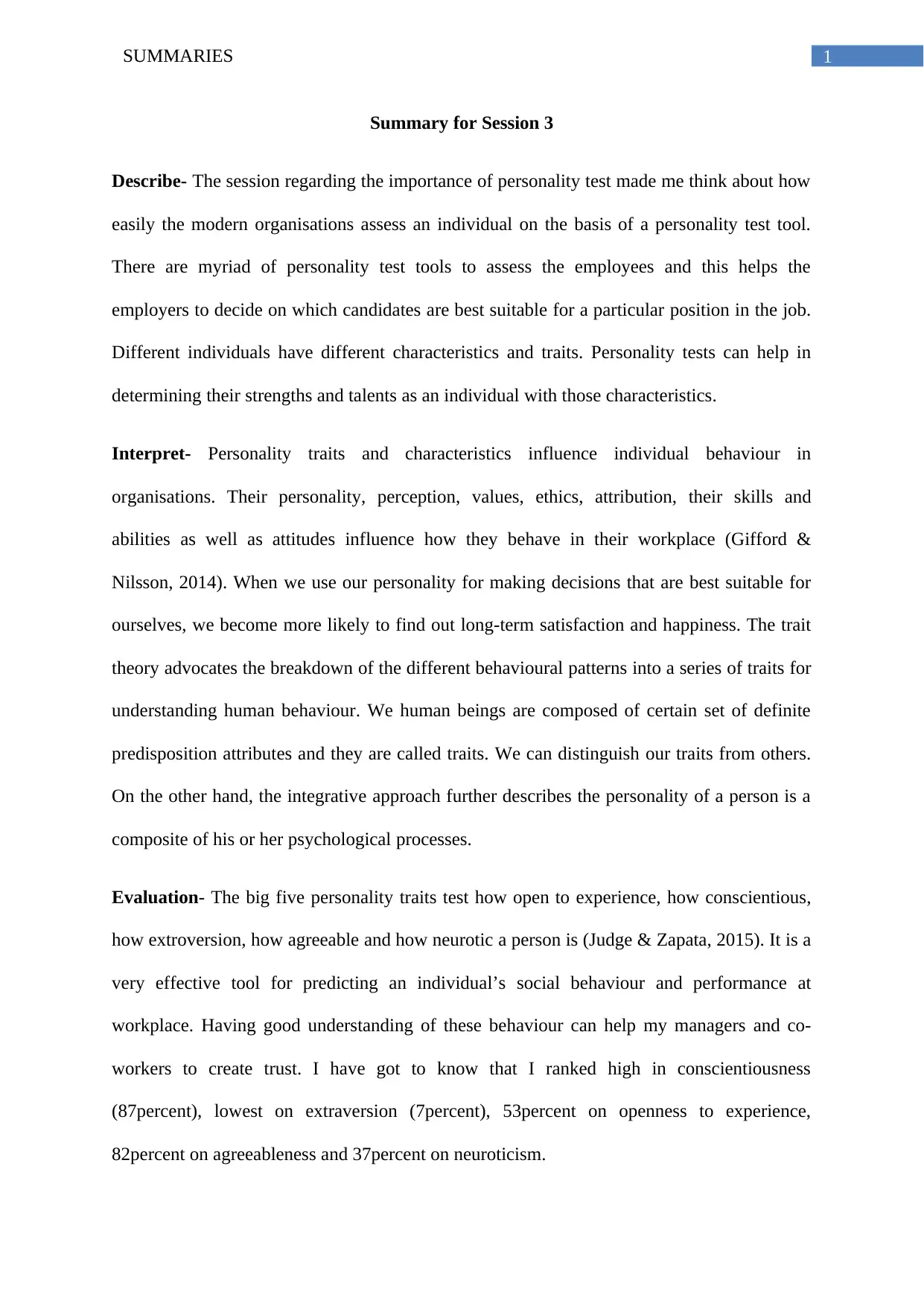
1SUMMARIES
Summary for Session 3
Describe- The session regarding the importance of personality test made me think about how
easily the modern organisations assess an individual on the basis of a personality test tool.
There are myriad of personality test tools to assess the employees and this helps the
employers to decide on which candidates are best suitable for a particular position in the job.
Different individuals have different characteristics and traits. Personality tests can help in
determining their strengths and talents as an individual with those characteristics.
Interpret- Personality traits and characteristics influence individual behaviour in
organisations. Their personality, perception, values, ethics, attribution, their skills and
abilities as well as attitudes influence how they behave in their workplace (Gifford &
Nilsson, 2014). When we use our personality for making decisions that are best suitable for
ourselves, we become more likely to find out long-term satisfaction and happiness. The trait
theory advocates the breakdown of the different behavioural patterns into a series of traits for
understanding human behaviour. We human beings are composed of certain set of definite
predisposition attributes and they are called traits. We can distinguish our traits from others.
On the other hand, the integrative approach further describes the personality of a person is a
composite of his or her psychological processes.
Evaluation- The big five personality traits test how open to experience, how conscientious,
how extroversion, how agreeable and how neurotic a person is (Judge & Zapata, 2015). It is a
very effective tool for predicting an individual’s social behaviour and performance at
workplace. Having good understanding of these behaviour can help my managers and co-
workers to create trust. I have got to know that I ranked high in conscientiousness
(87percent), lowest on extraversion (7percent), 53percent on openness to experience,
82percent on agreeableness and 37percent on neuroticism.
Summary for Session 3
Describe- The session regarding the importance of personality test made me think about how
easily the modern organisations assess an individual on the basis of a personality test tool.
There are myriad of personality test tools to assess the employees and this helps the
employers to decide on which candidates are best suitable for a particular position in the job.
Different individuals have different characteristics and traits. Personality tests can help in
determining their strengths and talents as an individual with those characteristics.
Interpret- Personality traits and characteristics influence individual behaviour in
organisations. Their personality, perception, values, ethics, attribution, their skills and
abilities as well as attitudes influence how they behave in their workplace (Gifford &
Nilsson, 2014). When we use our personality for making decisions that are best suitable for
ourselves, we become more likely to find out long-term satisfaction and happiness. The trait
theory advocates the breakdown of the different behavioural patterns into a series of traits for
understanding human behaviour. We human beings are composed of certain set of definite
predisposition attributes and they are called traits. We can distinguish our traits from others.
On the other hand, the integrative approach further describes the personality of a person is a
composite of his or her psychological processes.
Evaluation- The big five personality traits test how open to experience, how conscientious,
how extroversion, how agreeable and how neurotic a person is (Judge & Zapata, 2015). It is a
very effective tool for predicting an individual’s social behaviour and performance at
workplace. Having good understanding of these behaviour can help my managers and co-
workers to create trust. I have got to know that I ranked high in conscientiousness
(87percent), lowest on extraversion (7percent), 53percent on openness to experience,
82percent on agreeableness and 37percent on neuroticism.
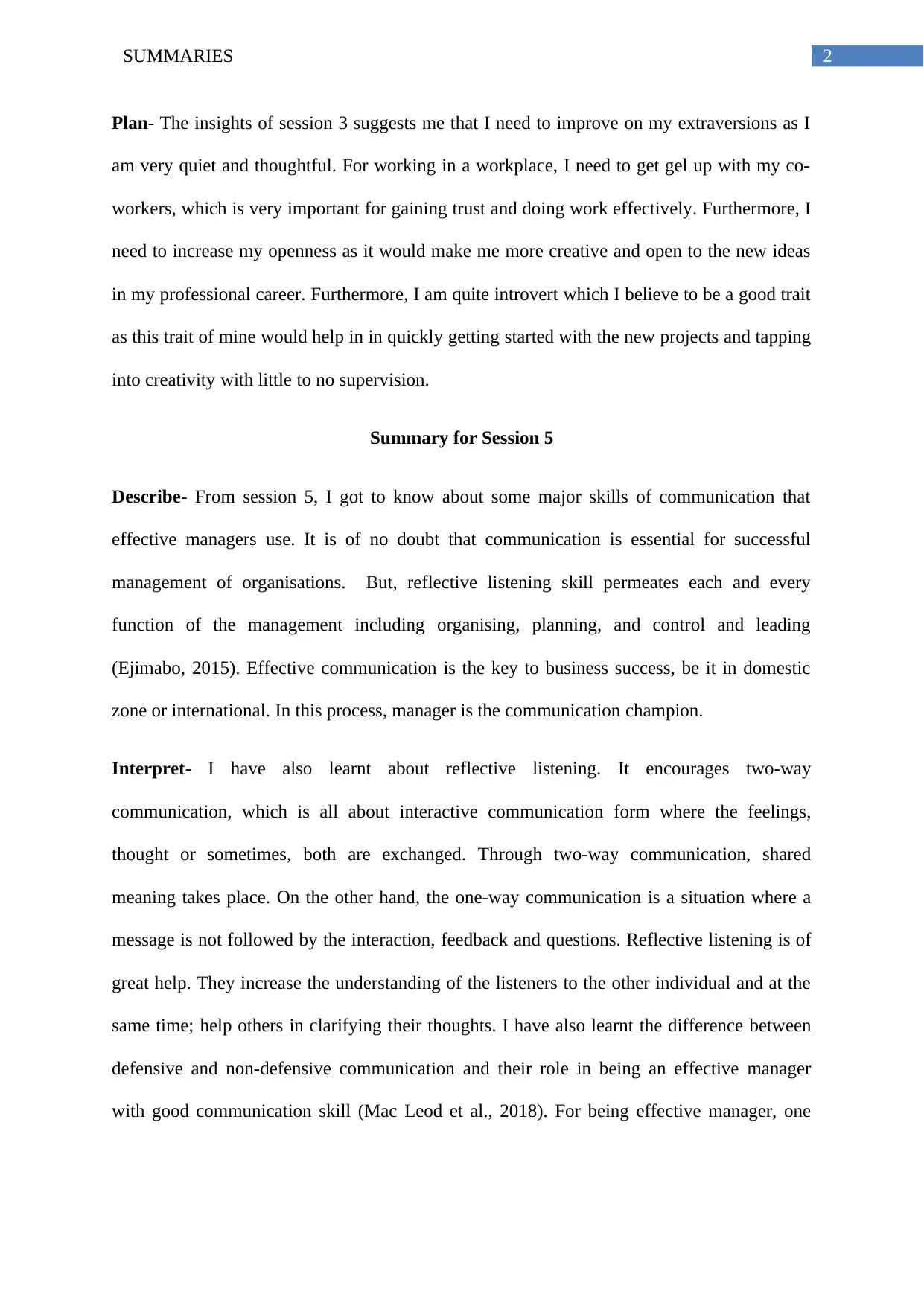
2SUMMARIES
Plan- The insights of session 3 suggests me that I need to improve on my extraversions as I
am very quiet and thoughtful. For working in a workplace, I need to get gel up with my co-
workers, which is very important for gaining trust and doing work effectively. Furthermore, I
need to increase my openness as it would make me more creative and open to the new ideas
in my professional career. Furthermore, I am quite introvert which I believe to be a good trait
as this trait of mine would help in in quickly getting started with the new projects and tapping
into creativity with little to no supervision.
Summary for Session 5
Describe- From session 5, I got to know about some major skills of communication that
effective managers use. It is of no doubt that communication is essential for successful
management of organisations. But, reflective listening skill permeates each and every
function of the management including organising, planning, and control and leading
(Ejimabo, 2015). Effective communication is the key to business success, be it in domestic
zone or international. In this process, manager is the communication champion.
Interpret- I have also learnt about reflective listening. It encourages two-way
communication, which is all about interactive communication form where the feelings,
thought or sometimes, both are exchanged. Through two-way communication, shared
meaning takes place. On the other hand, the one-way communication is a situation where a
message is not followed by the interaction, feedback and questions. Reflective listening is of
great help. They increase the understanding of the listeners to the other individual and at the
same time; help others in clarifying their thoughts. I have also learnt the difference between
defensive and non-defensive communication and their role in being an effective manager
with good communication skill (Mac Leod et al., 2018). For being effective manager, one
Plan- The insights of session 3 suggests me that I need to improve on my extraversions as I
am very quiet and thoughtful. For working in a workplace, I need to get gel up with my co-
workers, which is very important for gaining trust and doing work effectively. Furthermore, I
need to increase my openness as it would make me more creative and open to the new ideas
in my professional career. Furthermore, I am quite introvert which I believe to be a good trait
as this trait of mine would help in in quickly getting started with the new projects and tapping
into creativity with little to no supervision.
Summary for Session 5
Describe- From session 5, I got to know about some major skills of communication that
effective managers use. It is of no doubt that communication is essential for successful
management of organisations. But, reflective listening skill permeates each and every
function of the management including organising, planning, and control and leading
(Ejimabo, 2015). Effective communication is the key to business success, be it in domestic
zone or international. In this process, manager is the communication champion.
Interpret- I have also learnt about reflective listening. It encourages two-way
communication, which is all about interactive communication form where the feelings,
thought or sometimes, both are exchanged. Through two-way communication, shared
meaning takes place. On the other hand, the one-way communication is a situation where a
message is not followed by the interaction, feedback and questions. Reflective listening is of
great help. They increase the understanding of the listeners to the other individual and at the
same time; help others in clarifying their thoughts. I have also learnt the difference between
defensive and non-defensive communication and their role in being an effective manager
with good communication skill (Mac Leod et al., 2018). For being effective manager, one
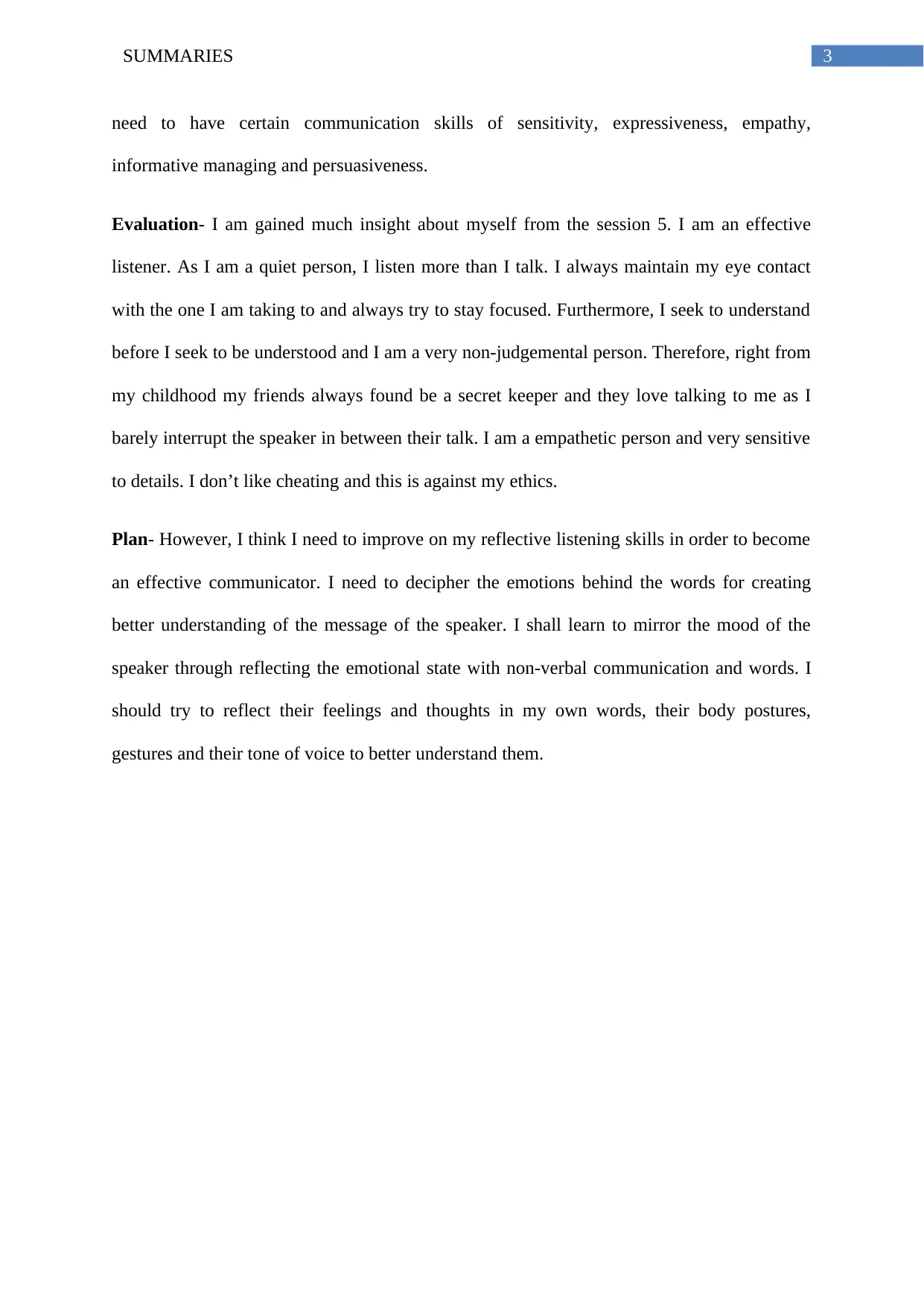
3SUMMARIES
need to have certain communication skills of sensitivity, expressiveness, empathy,
informative managing and persuasiveness.
Evaluation- I am gained much insight about myself from the session 5. I am an effective
listener. As I am a quiet person, I listen more than I talk. I always maintain my eye contact
with the one I am taking to and always try to stay focused. Furthermore, I seek to understand
before I seek to be understood and I am a very non-judgemental person. Therefore, right from
my childhood my friends always found be a secret keeper and they love talking to me as I
barely interrupt the speaker in between their talk. I am a empathetic person and very sensitive
to details. I don’t like cheating and this is against my ethics.
Plan- However, I think I need to improve on my reflective listening skills in order to become
an effective communicator. I need to decipher the emotions behind the words for creating
better understanding of the message of the speaker. I shall learn to mirror the mood of the
speaker through reflecting the emotional state with non-verbal communication and words. I
should try to reflect their feelings and thoughts in my own words, their body postures,
gestures and their tone of voice to better understand them.
need to have certain communication skills of sensitivity, expressiveness, empathy,
informative managing and persuasiveness.
Evaluation- I am gained much insight about myself from the session 5. I am an effective
listener. As I am a quiet person, I listen more than I talk. I always maintain my eye contact
with the one I am taking to and always try to stay focused. Furthermore, I seek to understand
before I seek to be understood and I am a very non-judgemental person. Therefore, right from
my childhood my friends always found be a secret keeper and they love talking to me as I
barely interrupt the speaker in between their talk. I am a empathetic person and very sensitive
to details. I don’t like cheating and this is against my ethics.
Plan- However, I think I need to improve on my reflective listening skills in order to become
an effective communicator. I need to decipher the emotions behind the words for creating
better understanding of the message of the speaker. I shall learn to mirror the mood of the
speaker through reflecting the emotional state with non-verbal communication and words. I
should try to reflect their feelings and thoughts in my own words, their body postures,
gestures and their tone of voice to better understand them.
Secure Best Marks with AI Grader
Need help grading? Try our AI Grader for instant feedback on your assignments.
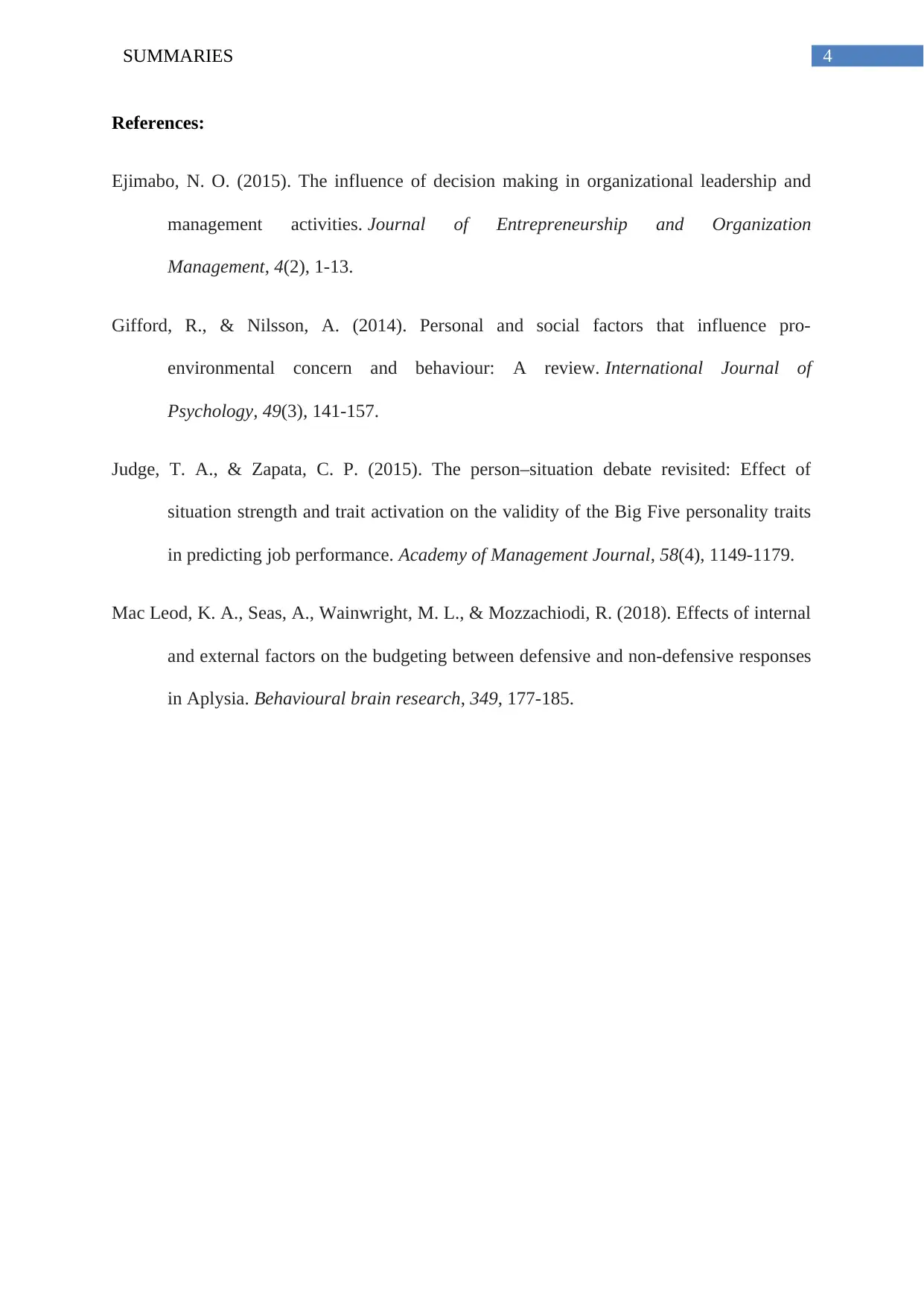
4SUMMARIES
References:
Ejimabo, N. O. (2015). The influence of decision making in organizational leadership and
management activities. Journal of Entrepreneurship and Organization
Management, 4(2), 1-13.
Gifford, R., & Nilsson, A. (2014). Personal and social factors that influence pro‐
environmental concern and behaviour: A review. International Journal of
Psychology, 49(3), 141-157.
Judge, T. A., & Zapata, C. P. (2015). The person–situation debate revisited: Effect of
situation strength and trait activation on the validity of the Big Five personality traits
in predicting job performance. Academy of Management Journal, 58(4), 1149-1179.
Mac Leod, K. A., Seas, A., Wainwright, M. L., & Mozzachiodi, R. (2018). Effects of internal
and external factors on the budgeting between defensive and non-defensive responses
in Aplysia. Behavioural brain research, 349, 177-185.
References:
Ejimabo, N. O. (2015). The influence of decision making in organizational leadership and
management activities. Journal of Entrepreneurship and Organization
Management, 4(2), 1-13.
Gifford, R., & Nilsson, A. (2014). Personal and social factors that influence pro‐
environmental concern and behaviour: A review. International Journal of
Psychology, 49(3), 141-157.
Judge, T. A., & Zapata, C. P. (2015). The person–situation debate revisited: Effect of
situation strength and trait activation on the validity of the Big Five personality traits
in predicting job performance. Academy of Management Journal, 58(4), 1149-1179.
Mac Leod, K. A., Seas, A., Wainwright, M. L., & Mozzachiodi, R. (2018). Effects of internal
and external factors on the budgeting between defensive and non-defensive responses
in Aplysia. Behavioural brain research, 349, 177-185.
1 out of 5
Related Documents
Your All-in-One AI-Powered Toolkit for Academic Success.
+13062052269
info@desklib.com
Available 24*7 on WhatsApp / Email
![[object Object]](/_next/static/media/star-bottom.7253800d.svg)
Unlock your academic potential
© 2024 | Zucol Services PVT LTD | All rights reserved.





